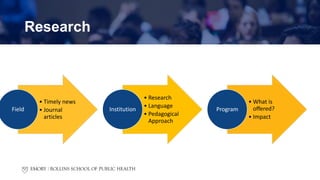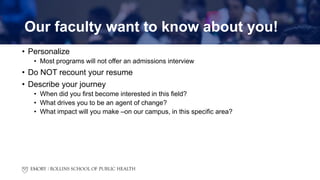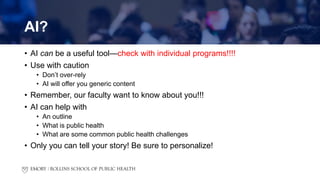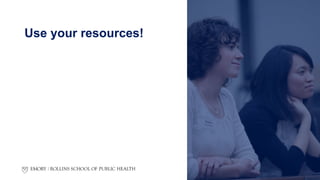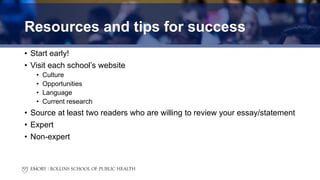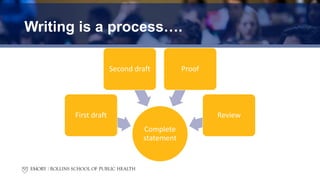Preparing a strong personal statement_fall_2023_grad_general.pptx
- 1. Preparing A Strong Personal Statement 2023
- 2. Agenda How to identify your interests/Your story Research Authenticity Use your resources Write and write again Keep it in perspective
- 3. Identify your interests • How did you first learn about this field? • Do you have a personal or lived experience which connected you to this area? • What about studying at this school/program stands out? • Why is it a match for your interests? • Think about your future: What do you hope to contribute to this field?
- 4. Identify your interests • It is ok to NOT have it all figured out • It is ok to have multiple areas of interest • You will learn and grow and things will take shape • Tell us about your current interests
- 5. Research!
- 6. Research • Timely news • Journal articles Field • Research • Language • Pedagogical Approach Institution • What is offered? • Impact Program
- 7. Be Authentic
- 8. Our faculty want to know about you! • Personalize • Most programs will not offer an admissions interview • Do NOT recount your resume • Describe your journey • When did you first become interested in this field? • What drives you to be an agent of change? • What impact will you make –on our campus, in this specific area?
- 9. Common Mistakes to Avoid Redundancy, Over simplicity, or Irrelevant details Arrogance Controversial or argumentative for the sake of it Plagiarism Humor or Negativity
- 10. AI? • AI can be a useful tool—check with individual programs!!!! • Use with caution • Don’t over-rely • AI will offer you generic content • Remember, our faculty want to know about you!!! • AI can help with • An outline • What is public health • What are some common public health challenges • Only you can tell your story! Be sure to personalize!
- 12. Resources and tips for success • Start early! • Visit each school’s website • Culture • Opportunities • Language • Current research • Source at least two readers who are willing to review your essay/statement • Expert • Non-expert
- 13. Write and write again
- 14. Writing is a process…. Complete statement First draft Second draft Proof Review
- 15. Keep it in perspective At most schools each application is reviewed carefully, using a holistic and contextualized approach What does this mean?
- 16. Holistic and contextualized admissions review • Cohort • Number of applicants • Size • Program Academics Skills Personal statement/ Experience Rec Letters
- 17. Contextualized review What opportunities has this applicant had access to? What skills have been gained by their lived experience, job, educational journey? Is there evidence of resilience, determination, and hard work can? Does this person have an interest in public health?
Editor's Notes
- Researching will help you to identify areas of public health that are compelling to you. It will also help you familiarize yourself with current language, trends, and research areas. This research will NOT be included in your personal statement—we aren’t looking for a research paper—but rather it will help influence your personal statement and might help your ideas take shape.
- The yellow represents holistic review. Each component of your application is looked at as part of a whole. No single component is more important than another. The blue represents outside factors---you can’t control those. Concentrate on what you can offer.
- In addition to looking at applicants holistically—we also want to be sure that we exploring the context of each applicant’s journey, life experiences, and educational opportunities. A note about the SCOTUS decision—we know that context and lived experiences for many students includes their identity. While our faculty reviewers will NOT have access to race/ethnicity data in accordance with the law—you can tell us about your lived experience in your personal statement. You can tell us how your lived experience has shaped your interest in public health. At Rollins we offer students the opportunity to also tell us about any specific challenges or hardships that students have encountered as part of their education journey. This is an OPTIONAL statement. Additionally, the SOPHAS application offers students the opportunity to tell us about any grades or classes taken that feel don’t represent you entirely –as a student. For example, you may have been sick for an entire semester and your grades suffered—or your education might have been disrupted by Covid. Our faculty committees are HUMAN. We understand that a lot can happen during undergraduate studies and we aren’t looking for perfection.






